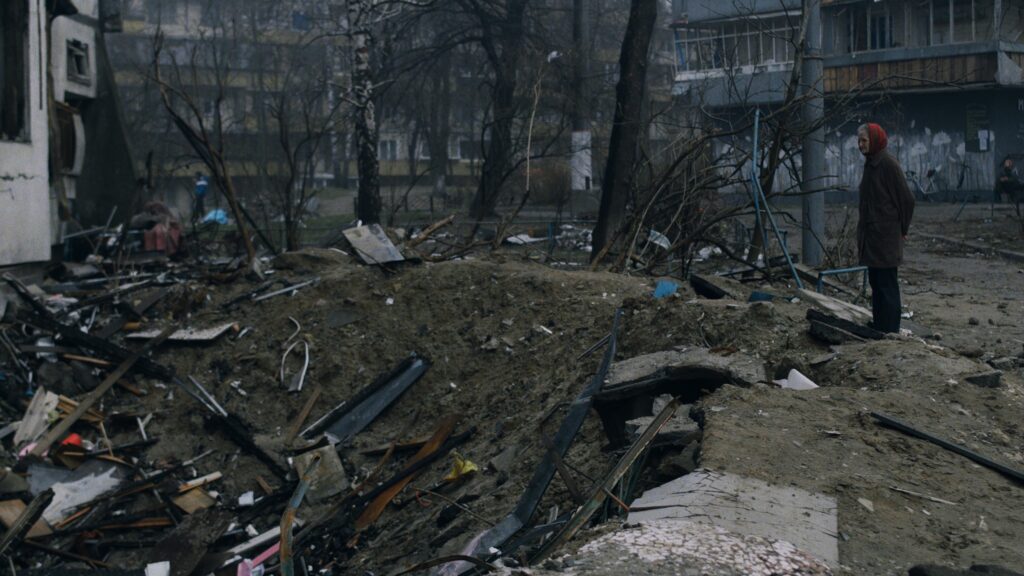Students and faculty discuss destruction in Bucha, Ukraine
4 min read
Professors and students discuss war crimes in the classroom. Mikhail Volkov | Unsplash
by ALLY TINGEN
Online Editor
Political science and international relations classes at UMW continue to discuss the Russia-Ukraine war. Among the destruction in Ukraine lies the city of Bucha, plagued by violence from Russian military units.
“The U.S. militaries and lots of other militaries take lots of precautions to try to limit the killing of civilian people during wartime,” said international relations Professor Jason Davidson. “Russians seem to have not been trying very hard, if at all. That in and of itself is problematic. But what happened in Bucha is its whole different category.”
UMW students are taking part in these discussions both in and out of the classroom.
“Inside of my classes before class starts, we’ve sometimes had small conversations about it,” said junior political science major Joey Zeldin. “Outside of class we’ve had a lot of discussions. It’s really scary to talk about. It’s daunting to see how many human rights violations are being actively committed yet ignored by most of the world.”
Zeldin hopes to do what he can to get involved from afar.
“If the opportunity arises, I’d like to volunteer this summer in programs that help refugees from Ukraine get the care that they deserve and support efforts towards thwarting Russia’s dangerous and horrifying actions,” said Zeldin.
Since Russia began its invasion of Ukraine on Feb. 24, various investigations have uncovered brutal attempts by Russian forces to overcome Ukraine and reach its capital, Kyiv.
The New York Times released a collection of photographs from within Bucha, documenting death, sexual assault and destruction. These firsthand accounts are leading many to believe Russia is committing war crimes against civilians in Bucha.
Organizations like Human Rights Watch are documenting laws-of-war violations across Ukraine.
“There are human rights organizations that have documented evidence,” said Melissa Martinez, a UMW political science professor who specializes in human rights, criminal organizations and post-conflict societies in Latin America and Sub-Saharan Africa. “There’s still investigations that are ongoing to officially say there’s absolute evidence.”
However, Martinez said that this evidence must be taken to the International Criminal Court in order for Russian forces to be held accountable.
“It takes years and that’s the unfortunate part,” she said. “It’s not just about finding Russia in general guilty of these crimes, but it’s about, well, who exactly is guilty? Which individuals are we going to hold for trial?”
Davidson also said that pinpointing who exactly is at fault will be difficult.
“What is unclear is whether you have rogue units, whether you have a command that is not closely monitoring or controlling their troops, or was it the command?” he said. “Countries violate international law all the time, and specifically things like the law of war, or ‘jus in bello.’ There’s really not a ton that can be done about it.”
Davidson said the consequences may be minimal.
“I would not be surprised if there are very few people who actually go to prison or serve any sort of sentence as a consequence of this,” said Davidson. “And that’s just an unfortunate part of the world that we live in where powerful countries like Russia get away with a lot more than weaker countries do.”
Although work is being done to aid Ukraine in its fight against Russia, many fear what the future holds.
“I think, sadly, what appears to be coming next from everything that I’m reading is that Russia is actually planning to engage in an even more brutal campaign in East Ukraine,” said Davidson. “What is probably most likely in Ukraine is lots of aerial bombardment and missile engagements that are going to blow up buildings and other areas that include civilians.”
Martinez discusses the war in her Intro. to Political Science and Developing Countries classes.
“It was really in terms of trying to understand the multiple players, what’s happening and what could potentially happen if it escalates,” she said.
Davidson has also incorporated current events into his classes. Through content like international law, he is able to explain relevant legal processes and the International Court of Justice that is pursuing Russia.
“There’s sort of the set material and then I always bring in something contemporary, and this semester, obviously, this has been kind of the main show in international relations,” he said. “We talked about the International Criminal Court, potential international criminal court cases investigation, preliminary investigation and then the possibility for some sort of ad hoc tribunal.”
As the Russia-Ukraine war continues, global efforts denouncing Russia have escalated.
“Maybe the good news here is that I think, in terms of numbers of countries, there’s been a real widespread unity in terms of condemning Russia,” said Davidson. “So, unlike many past conflicts, let’s say the 2003 Iraq War, where the international community was kind of split, there’s very few countries that are defending Russia because of this.”


